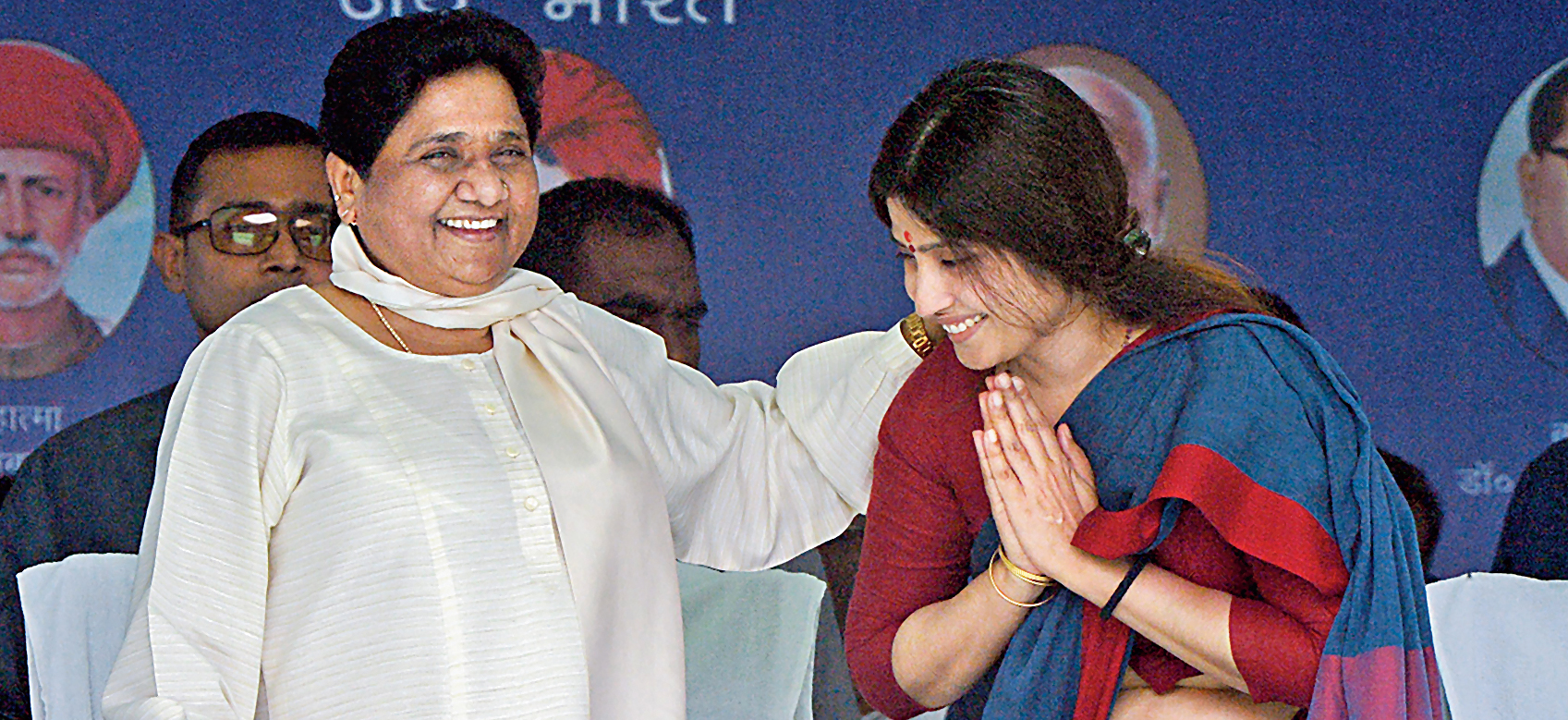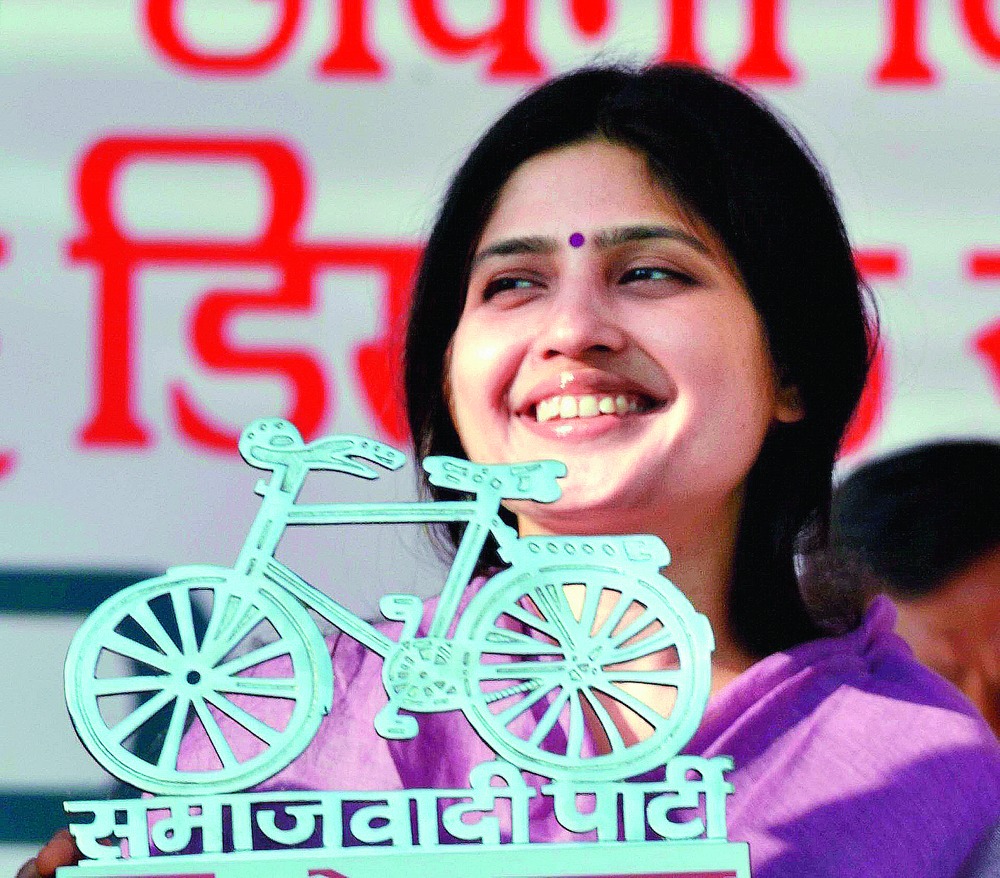The well-paved roads of Kannauj were awash with imagery signalling a coming together of “red” and “blue” politics as campaigning for the April 29 vote wound up on Saturday.
It’s a vision that then JNU student leader and sedition accused Kanhaiya Kumar had invoked on his release from jail in 2016, recalling his blue and red prison bowls that symbolised the colours of the Ambedkarite and Left movements, respectively.
Except that in Kannauj, the red represents not the Left but the Samajwadi Party, ally of the Bahujan Samaj Party that claims to speak for the Dalits.
Almost every mode of transport used in mahagathbandhan candidate Dimple Yadav’s road show, from bicycles and tractors to the beefy SUVs that now signify power, sported the flags of both parties.
Samajwadi workers, aboard the vehicles side by side with their BSP counterparts, said this coordination extended to the backroom meetings held to prepare for the next stage of the election — booth management — although Kannauj is a “SaPa” seat. Kannauj votes on Monday.
And not just any seat but one known as “Akhilesh Yadav ka karmabhoomi’’ (workplace of Akhilesh Yadav, the Samajwadi president), which his wife Dimple has held since he was elevated to chief minister in 2012.
“She is batting for a hat-trick of wins; BJP candidate Subrat Pathak too is on a hat-trick — of defeats,” Samajwadi youth leader Yogesh Yadav said.
Akhilesh enjoys considerable goodwill in the area; his wife not so much as the BJP has been able to use its communication skills to project her as aloof and inaccessible.
For whatever the alliance slogan of “Vikas ki chhavi, Dimple bhabi’’ (Dimple embodies development) is worth, the people in this rural and patriarchal area, known for its perfume industry, attribute their increased amenities to Akhilesh.
Dimple is at best seen as a custodian of the Yadav family’s fief, which extends to adjacent Mainpuri and Etawah.
With Kannauj boasting an estimated upper caste population of around three lakh apart from two lakh Lodhs (traditionally BJP supporters), the Samajwadis have made a special effort to play the gender card, hoping for an impact beyond the alliance’s caste and community matrix.
It’s a gambit to offset the threat of counter-polarisation in favour of Pathak, who is also expected to receive some of the non-Yadav OBC and non-Jatav Dalit votes that had helped power the BJP’s rise in 2014.
The BJP has deployed considerable firepower to wrest the seat, a socialist bastion that Ram Manohar Lohia and Mulayam Singh Yadav have represented in the past.
But the caste equations seem to favour Dimple, one of her campaigners asserted. “The BJP could not win from here in 2014 despite the Modi wave, when we all fought separately,” Samajwadi national secretary Asit Yadav said.
“Now we have the alliance, and our aim is to not just win but also increase the victory margin, which was rather low the last time.”
The Congress is sitting out the election here, so its secular vote bank is expected to support Dimple.
District Congress president Vijay Mishra believes it will be a tough fight but expects the alliance to win.
As elsewhere, the BJP’s election plank is Narendra Modi — a pitch the Prime Minister himself seemed to endorse during his rally in Kannauj on Saturday.
Not once during his 40-minute speech did he mention any of the three candidates: for Kannauj and adjoining Etawah and Farrukhabad.
Instead, he peppered his speech with references to himself and exhorted the crowd: “Kamal ka phool ka button jab aap dabaoge, toh woh Modi ke khaate mein jayega (When you press the lotus button, the vote will go to Modi’s account).”
While Brand Modi remains a force to reckon with here, people are not talking about it as enthusiastically as they had in 2014.
Also, the daily problem of dealing with stray cattle under Yogi Adityanath’s rule has chipped away at the BJP’s popularity.
Since cow vigilantism has made the transport of cattle for sale a risky and expensive business, owners who cannot afford to feed their ageing cows and bulls are abandoning them. So, farmers now face the double burden of protecting their standing crop and fencing their fields to keep these stray animals at bay.
“These animals have added to our problems. How long can we keep our cows? The Yogi government should make some arrangements for the stray cattle,” said Raghunandan Singh, an avowed BJP supporter from the Lodh community in Chhibramau village.
Singh’s village is now on the national grid thanks to the Agra-Lucknow Expressway, built when Akhilesh was chief minister.
That the Opposition narrative of the BJP being pro-rich has had an effect was evident from what Umesh “Babaji” Chandra, a Lodh who runs the Baba Dhaba along the expressway, had to say.
“Under no other government were the power cables to farmers cut if we did not pay the bill on time. They would only warn us. The Yogi government did that (cut the cables) but did not touch the defaulting factories,” Chandra said.
But in neighbouring Mundala village, street vendor Jadhunath Singh Kushwaha said he dreaded the possible return of lawlessness if the Yadavs came to power.
“Jeetenge toh bachcha pet se Akhilesh ban kar ata hai (When the Yadavs win, even their newborns act like they are Akhilesh),” he said.
Kushwaha added that the Samajwadi leader himself was “not like that” but the bullying ways of some of his followers tended to give him a bad name.











